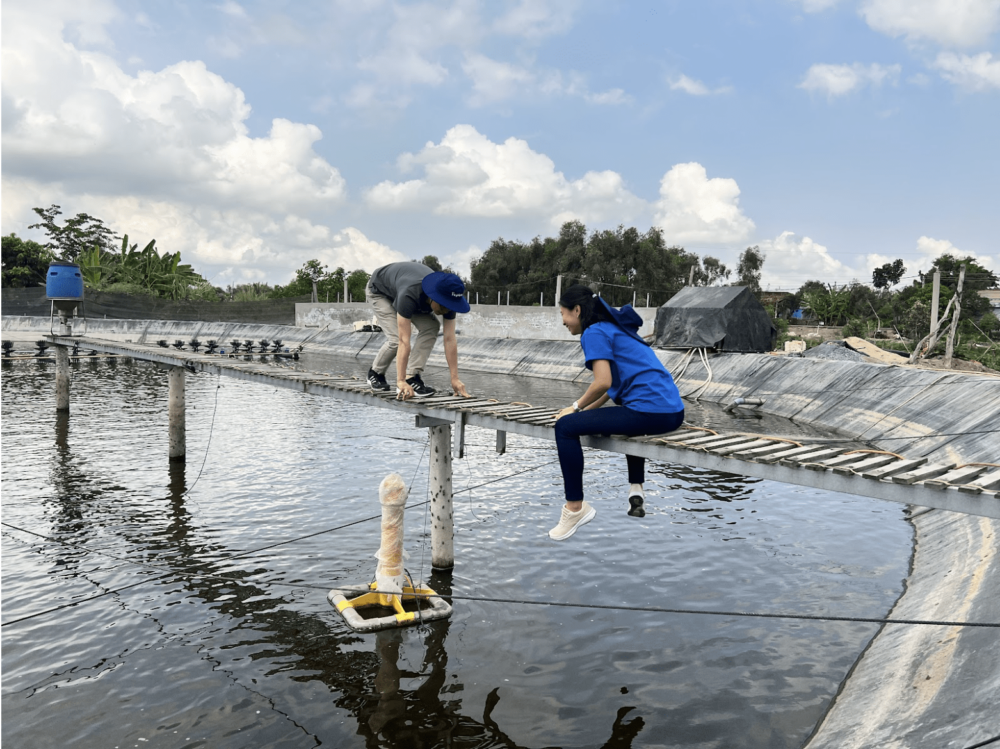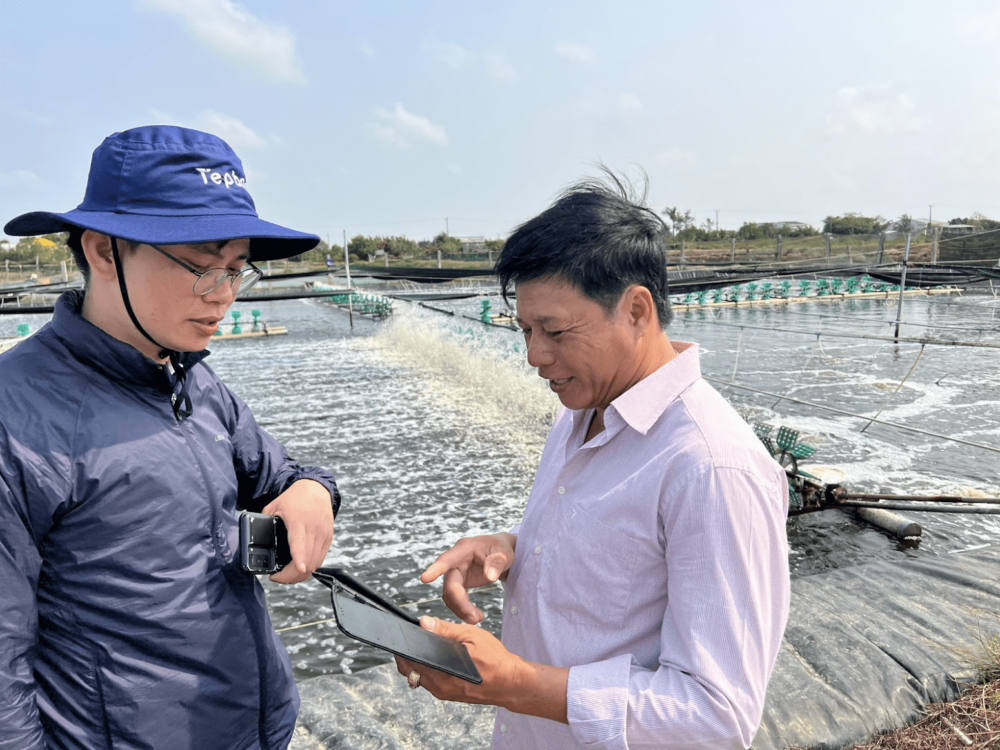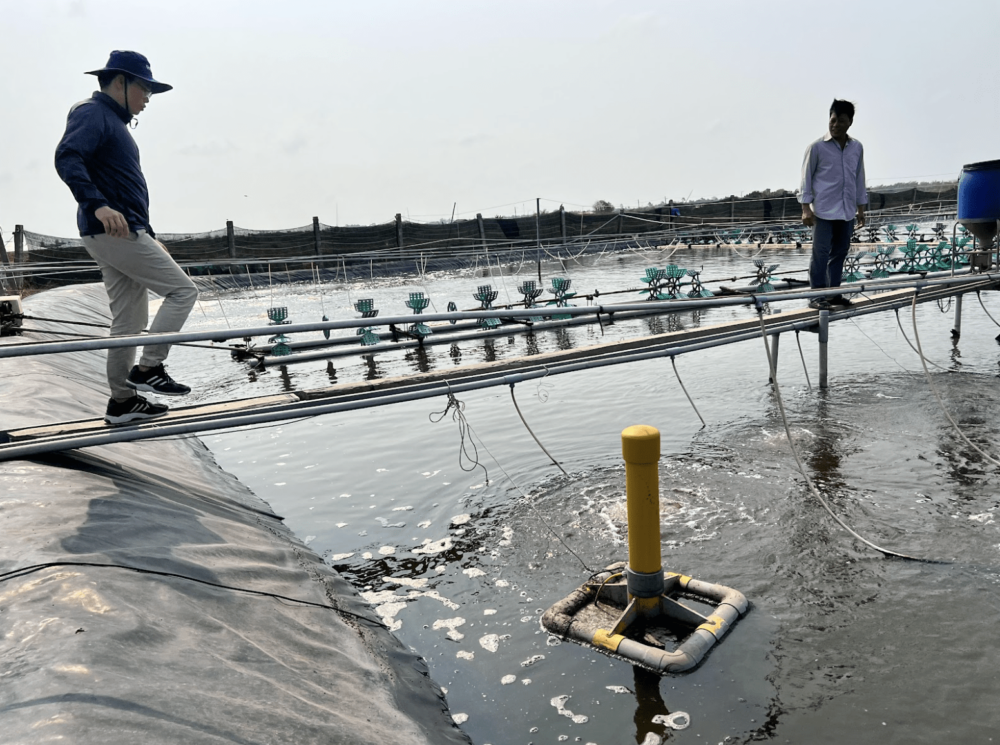Editor’s Note: Aquaculture startup Tepbac recently landed a $2.25 million pre-Series A round led by Aqua-Spark, AgFunder and Son-Tech Investment. Angela Tay, senior investment associate at AgFunder Asia, explains why AgFunder chose to invest.
Disclosure: AFN’s parent company is AgFunder.
How did I end up sitting on a bridge like a literal lame duck, in the middle of a shrimp pond, not daring to move forwards or backwards because either me, my phone or both of us could drop into the water at any moment?
Such was the start of my trip to get an in-person understanding of shrimp farming in Vietnam by visiting Tepbac, AgFunder’s first Vietnam aquaculture investment out of both the AgFunder Grow Impact Fund and AgFunder SIJ Impact Fund.

Bridge over troubled shrimping water
Tepbac co-founders Lam Nguyen and Trần Duy Phong took me to visit some southern Vietnam shrimp farms, some of which are Tepbac customers. Vietnam is one of the top five producers of shrimp in the world, accounting for more than $4 billion out of the $32 billion global shrimp market. Tepbac says the country plans to triple production in the future.
At first, I walked out confidently along one of the bridges that are a common sight at most shrimp ponds, only to feel it sway a few seconds later as I realized it wasn’t as structurally sound as I’d assumed.
This image is almost a metaphor for shrimp farmers everywhere as they attempt to balance and manage the uncertainties of what is inherently a very risky business.
When done right, shrimp farming can be very lucrative. But shrimp farming in Vietnam faces several challenges, including inefficient farming practices leading to reduced productivity and lower yield, higher costs, disease outbreaks, and negative environmental impact. A disease outbreak can wipe out the livelihood and wealth of shrimp farmers, and it could take decades before they are able to recover, reducing many of them to poverty.

Bringing farmers an additional 30% of value per harvesting season
To address these challenges and help farmers improve efficiencies, productivity, reduce their risks and farm shrimp sustainably, Phong, together with his classmate Lam Nguyen, co-founded Tepbac in 2012.
Initially, they started a media company Tepbac.com, to plug the market gap in information sources about aquaculture. Tepbac.com has since scaled to become one of the most popular aquaculture resources in the world. As the cornerstone of the ecosystem, they went on to develop Farmext, a comprehensive suite of farm management SaaS solutions and hardware devices which help with automation, remote controls and environmental monitoring for shrimp farmers.
Both Phong and Lam come from shrimp farming backgrounds. Phong grew up helping on his father’s shrimp farm and went on to major in aquaculture before learning to code and build machines himself. Lam’s family also farmed shrimp for decades. It is not a stretch to say that thanks to their backgrounds, they are personally connected to most of the stakeholders in the industry, from the universities to feed companies and seafood processors and exporters.
There are many aquaculture hardware companies out there; most fail to make a splash in the market because they provide inaccurate information or their machines break easily due to being submerged in dirty water.
What sets Tepbac’s Farmext apart from the rest of the pack is the “Envisor,” the IoT device that Phong and his team spent more than four years developing and testing in the field to ensure efficacy. Envisor is the world’s first patented environmental measuring device, and its self-cleaning capability means that it delivers accurate data, thus enabling the entire automation process to run smoothly. Envisor can be deployed on one of those bridges that are a common sight at most shrimp ponds, enabling farmers to feed their shrimp and check on their health. You can also see auto feeder machines and feed trays positioned on the bridges.
Tepbac estimates that the cost of implementing Farmext could bring farmers up to an additional 30% of value per harvesting season. Phong also has ambitions to digitize the entire production supply, starting with an e-commerce platform to help shrimp farmers connect with input material suppliers and help them save 20% to 30% on input materials, and build out a full financing and exchange platform in the near to medium term.

An ‘unwavering’ commitment to farmers
Tepbac has to date served about 1,500 farms. The company’s clientele ranges from small- and large-scale farmers to shrimp processing plants to the government.
On my trip, it was clear to see why their businesses have been and will keep growing. The shrimping industry in Vietnam remains largely un-digitized. Tepbac offers an easy-to-use solution that addresses farmers’ needs, improve crops and, most importantly, is affordable for farmers and owners (who are often one and the same).
As a venture capitalist, I have had the opportunity to work with some truly incredible startup founders, but few have impressed me as much as Phong and Lam. While their family’s backgrounds in shrimp farming have given them unique perspectives on the industry and a deep understanding of the challenges that farmers face, the Tepbac team especially stands out for its unwavering commitment to bettering the lives of farmers, improving the aquaculture industry of Vietnam and laser-sharp focus of driving Tepbac forward from one milestone to the next.
We have no doubt that Tepbac will continue to be a driving force in the industry for years to come.






